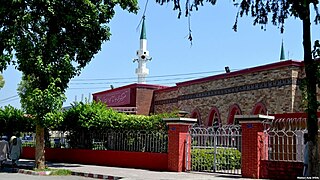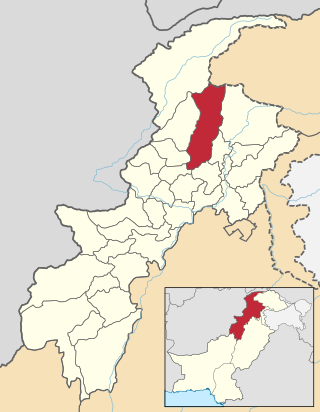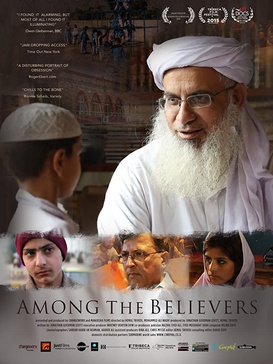Related Research Articles

Azam Tariq was a Pakistani politician and Islamic scholar who was the leader of Sipah-e-Sahaba Pakistan (SSP). He was assassinated in 2003.

Jamia Syeda Hafsa, commonly known as Jamia Hafsa, is a Deobandi madrassa adjacent to the Lal Masjid in Islamabad, the capital of Pakistan. The madrassah was established in 1992 by Maulana Abdullah Ghazi, who remained the Chancellor until he was assassinated by unknown gunmen in October 1998.

Mawlānā Abdul Aziz is a Pakistani Islamic scholar of the Deobandi movement who serves as the Imam and Khatib of Lal Masjid, Islamabad, which was the site of a siege in 2007 with the Pakistani army. He also serves as the Chancellor of Jamia Faridia and Jamia Hafsa.

Mawlānā Abdul Rashid Ghazi was a Pakistani Islamic scholar and fundamentalist who served as Deputy Khatib of Lal Masjid and the President of Faridia University. Prior to this, he had also briefly served as a diplomat for UNESCO.

The siege of Lal Masjid was an armed confrontation in July 2007 between Islamic fundamentalist militants and the government of Pakistan, led by president Pervez Musharraf and prime minister Shaukat Aziz. The focal points of the operation were the Lal Masjid and the Jamia Hafsa madrasah complex in Islamabad, Pakistan.

The Lal Masjid is a congregational mosque located in Islamabad, the capital of Pakistan. It is located near Abpara Market. It was constructed in 1966 and is one of the oldest mosques in the city. It was also the largest mosque in the city for twenty years, until the Faisal Mosque was built in 1986.
Lieutenant Colonel Haroon Islam was an officer in the Pakistan Army's Special Service Group who died during Operation Silence. He was a commanding officer of Operation Silence while commanding the Zarrar Anti Terrorist Unit. He was killed in fierce fighting which took place inside the Red Mosque Complex while leading a small force of 150 SSG members. The Special Service Group successfully took over the complex. On March 23, 2008, he was posthumously awarded the second highest civilian award, Hilal-e-Shujaat by the President of Pakistan.

Sheikh al-Hadith Mawlānā Muhammad Abdullah Ghazi was a Pakistani Islamic scholar and theologian who served as Chairman of Ruet-e-Hilal Committee and as the first Imam and Khatib of Lal Masjid, and founded Jamia Faridia University and Jamia Hafsa.

The insurgency in Khyber Pakhtunkhwa, also known as the War in North-West Pakistan or Pakistan's war on terror, is an ongoing armed conflict involving Pakistan and Islamist militant groups such as the Tehrik-i-Taliban Pakistan (TTP), Jundallah, Lashkar-e-Islam (LeI), TNSM, al-Qaeda, and their Central Asian allies such as the ISIL–Khorasan (ISIL), Islamic Movement of Uzbekistan, East Turkistan Movement, Emirate of Caucasus, and elements of organized crime. Formerly a war, it is now a low-level insurgency as of 2017.
The 2007 timeline of the insurgency in Khyber Pakhtunkhwa:
In the Lal Masjid bombing of 6 July 2008 at 7:50 pm local time, a 30-year-old suicide bomber blew himself up near the Lal Masjid mosque in Islamabad, the capital of Pakistan, killing 18 policemen and 1 civilian. The bombing occurred on the first anniversary of the siege of Lal Masjid and was likely a revenge attack. The attack occurred even amid tight security in Islamabad, where thousands of Islamic students in Pakistan came to mark the day when Pakistani troops stormed Lal Masjid. Pakistani Interior Minister Rehman Malik, who visited the blast site, said about 12,000 students attended the rally and the attack was directed at police.

Tehreek-e-Nafaz-e-Shariat-e-Mohammadi is an Islamic extremist militant group. The group swore an oath of loyalty to Pakistani Taliban and become the part of it in 2007 aftermath the siege of Lal Masjid. The group's stated objective is to overthrow the Pakistani government and enforce Sharia law in Pakistan.

Operation Black Thunderstorm was a military operation that commenced on April 26, 2009, conducted by the Pakistan Army, with the aim of retaking Buner, Lower Dir, Swat and Shangla districts from the Tehrik-i-Taliban Pakistan after the militants took control of them since the start of the year.

The Second Battle of Swat also known as Operation Rah-e-Rast, began in May 2009 and involved the Pakistan Army and Tehrik-i-Taliban Pakistan militants in a fight for control of the Swat district of Pakistan. The first Battle of Swat had ended with a peace agreement, that the government had signed with the Tehrik-i-Taliban Pakistan in February 2009. However, by late April 2009 government troops and the Tehrik-i-Taliban Pakistan began to clash once again, and in May the government launched a military offensive code-named Operation Black Thunderstorm throughout the Swat district and elsewhere to oppose the Tehrik-i-Taliban Pakistan.
In 2007, 34 terrorist attacks and clashes, including suicide attacks, killings, and assassinations, resulted in 134 casualties and 245 injuries, according to the PIPS security report. The report states that Pakistan faced 20 suicide attacks during 2007, which killed at least 111, besides injuring another 234 people. The PIPS report shows visible increase in suicide attacks after the siege of Lal Masjid.
In 2008, Pakistan saw 40 terrorist attacks, which caused 154 fatalities and 256 injuries.

Basti-Abdullah Shaheed is a Village situated a short distance from Rojhan in Rajanpur District, the border district of Punjab province in Pakistan.

Among the Believers is a 2015 documentary film directed by Hemal Trivedi and Mohammed Ali Naqvi and produced by Jonathan Goodman Levitt and Hemal Trivedi. The executive producer was Whitney Burton Dow and co-producers were Naziha Ali and Syed Musharaf Shah. The film had its US premiere at Tribeca Film Festival on April 17, 2015 and was pitched at the 2013 MeetMarket as part of Sheffield Doc/Fest. After its theatrical release, it aired on television on World's Doc World.
In July 2007, a series of suicide bombings took place across Pakistan in the aftermath of the Lal Masjid siege which resulted in an end to the 10-month truce held by the Waziristan Accord. At least 154 people were killed and more than 230 others were injured in the suicide attacks.

Jamiatul Uloom Al-Islamia Al-Faridia, commonly known as Jamia Faridia, is an Deobandi Islamic university situated near the Faisal Mosque in Sector E-7 of Islamabad, Pakistan. The university was established in 1971 by Maulana Abdullah Ghazi, who remained the Chancellor until he was assassinated by unknown gunmen in October 1998.
References
- ↑ The Ghazi Force:Vengeful new militant group emerges in Pakistan
- ↑ "Five most wanted militants". DAWN.COM. 2011-08-18. Retrieved 2019-01-20.
- ↑ "Islamabad police capture 'Ghazi Force' commander | FDD's Long War Journal". www.longwarjournal.org. 2009-11-20. Retrieved 2019-01-20.